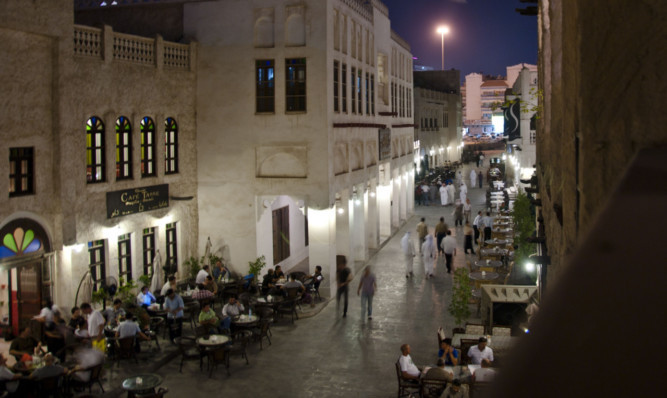
Our dos and don’t for travellers to Qatar’s capital.
Qatar’s working week is Sunday to Thursday, so shops are usually closed on Fridays and in some cases also on Saturdays.
Qatar is an Islamic country. Take care to behave appropriately, particularly during Ramadan. It is expected visitors dress modestly no shorts or sleeveless T-shirts for men. Ladies must have shoulders, upper arms and legs to beyond knees covered when outwith hotels.
Qatar is officially pronounced ‘KA-tar’.
Alcohol is not completely illegal, but there are a number of laws which apply to alcohol and its consumption. Expats can buy alcohol via a permit system. It is also available in licenced restaurants and hotels which may sell alcohol to adult, non-Muslim customers, in restricted areas.
Souq Waqif: Doha’s “standing market”, redeveloped in 2004 under the auspices of Sheikh Hamad bin Khalifa al Thani. Fear not, this isn’t a tourist trap. Based on old plans, maps and the memories of those who lived in the original souq, it is as much the haunt of locals as visitors. Within the maze of traditional architecture are artisan and craft shops, large markets selling everything from spices and dried fruit to traditional Qatari dress, small restaurants and stalls for souvenir-savvy vendors.
Museum of Islamic Arts: This outstanding place (mia.org.qa) is as popular as much for its building as its art. Architect of the Louvre Pyramid in Paris, I.M. Pei, travelled the Arab world for inspiration and found it in everything from the ablutions fountain in the Mosque Ahmed ibn Tulun in Cairo to some of the Islamic world’s most treasured works of Art. See pieces that date back to the 7th Century or sit in the magnificent five-storey atrium and enjoy views across Doha Bay to the city.
The Corniche: Walk around (or be driven, if too hot) Doha’s 7km promenade, which is marked at one end by the museum and at the other by the heart of this amazing city.
Take a dhow: If you’ve walked the length of the Corniche, why not float back? Doha’s dhows, original wooden craft that once served the fishing and pearling industries, now provide a means for tourists to joyride around the harbour. We went on a barbecue cruise which was delightful (though bear in mind Qatar is ‘dry’ totally apart from buying alcohol in 5-star hotels at 5-star prices).
Go shopping: Malls abound with top-notch franchises and brands. The Villaggio Mall has an indoor canal, on which shoppers can take a gondola ride (yes, really), and for an even higher-end shopping experience, the Pearl-Qatar is Doha’s latest take on luxury living. Built on reclaimed land, the island is touted as Riviera Arabia. Its central Porto Arabia is lined with luxury cruisers that belong to not just millionnaires but billionaires.
The official language is Arabic but English is widely spoken.
Before the discovery of oil, the economy of Qatar depended on fishing and pearling. Doha, the capital of Qatar, was once a fishing village, where pearl fishers were looking to make their fortunes.
There can be up to a QR200 (roughly £34) fine for spitting in the street.
Pick the time you travel carefully. Average daily highs are around 21 degrees Celsius in winter and 40 degrees Celsius in summer.
Qatar has the world’s largest production and proven reserves of oil and natural gas, per capita.
Although one of the richest countries in the world it is also one of the smallest, with a population of just over 2,000,000.

Enjoy the convenience of having The Sunday Post delivered as a digital ePaper straight to your smartphone, tablet or computer.
Subscribe for only £5.49 a month and enjoy all the benefits of the printed paper as a digital replica.
Subscribe